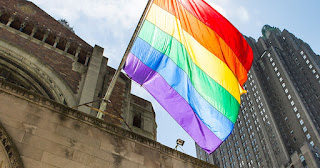Fr. Aleksandr Groves was ordained a priest by Bishop Irenei in London on the Feast of the Entry of the Mother of God, this past Sunday. A Twitter user used the occasion to attack Fr. Aleksandr, and to accuse him of being a homosexual, and also to attack ROCOR as a whole as somehow being pro-LGBTQP. This claim was made on the basis of an article in the Daily Telegraph from 2013, which referred to Fr. Aleksandr and his business partner as a "couple." Having been quoted by reporters about a half dozen times in my life, I don't believe I was ever quoted accurately in even a single case... and some of these were in non-controversial contexts, in which intentional misrepresentation would not have been a motive. It is not hard to imagine how referring to a business partner as a "partner" could be taken the wrong way in our times is not hard to imagine.
I have heard from Orthodox people from the who have said that in their corner of England, the Orthodox community is very small, and so if something like this were actually true, it would be known, but of course it is not true.
St. Paul warns us that we should not receive an accusation against a presbyter, except from at least two or three witnesses (1 Timothy 5:19). So obviously, any Orthodox Christian that may have had questions raised by this article should have made some effort to find out if it was true before spreading it on Twitter for all the world to see.
A clergyman that I am very good friends with and know to be completely trustworthy, who was also present for the ordination, and who knows Fr. Aleksandr, sent me the following text, asking that it be posted on Twitter. Since it is too big to post to Twitter directly, I am including it in this post, and will post the link on Twitter:
"What’s the end game of this post? To cause emotional distress to a newly ordained priest and disorient catechumens? Fact checking on Twitter or public media is an idle strategy to start with. Why not contact the Bishop and clear your concerns, if any?
The Daily Telegraph article from nearly ten years ago misconstrued the information shared during the interview. Stephen (received into Orthodoxy as Aleksandr) and Paul are life-long friends, who unequivocally presented themselves to the reporter as business partners, not a couple. The property they own is a 9-bedroom old Victorian house, with ample space even when it was split into several apartments, so both friends always lived in separate rooms. For anyone who is even loosely familiar with the UK real estate market, there is nothing unusual when an old Victorian mansion is converted into a multi-user/tenant facility, depending on the business strategy and needs.
Bishop Irenei and many parishioners from the Cathedral visited this property and met with Mr Oxborrow as well. Aside from the chapel mentioned in the 2013 article, Fr Aleksandr and several parishioners from the London Cathedral built a new small church, which is due to be blessed/consecrated by Bishop Irenei as a new ROCOR parish to which Fr Aleksandr will be attached.
It’s not a secret that any candidate to ROCOR clergy has to state, amongst other covenants, his attitude to homosexuality, be diligently tested and vetted by his Spiritual Father and other senior clergy of the Diocese. There was no exception or cut-corners in this case. Fr Aleksandr does not hold views other than the teaching of the Orthodox Church on human sexuality, and is a celibate man, living a chaste life. Furthermore, Fr Aleksandr served as a reader and then a deacon at the Cathedral under Bishop’s Irenei’s direct supervision.
I can certainly appreciate the confusion about the DT article, but a critical eye would find it rather unusual that two converts to Orthodoxy (who are being called Catholics by the reporter) decide to build a new Orthodox chapel on their property for morning and evening prayers. Yet, why ROCOR? There are several Greek parishes to choose from in the area. It takes Fr Aleksandr 4 hrs each Sunday to drive to and from the London Cathedral. These sort of things would at least make you question the DT article, but you didn’t and continued to push the narrative.
Unfortunately, British reporters do not bother sharing their draft articles with the people they interviewed. Nor do there seem to be any checks for plagiarism in their material, as the 2021 article appears to be a recycled text lacking any new significant details. The 2013 publication caused a lot of stress to now-Father Aleksandr. He was horrified at the way the DT article was written and phrased (and also that it became the basis for another article), but at the time he winced and thought no more -- anyway, how can such things be corrected once published?
Please delete this post and send your apology (as a new post?) to Fr Aleksandr, his Bishop, and your subscribers some of whom you managed to confuse."


